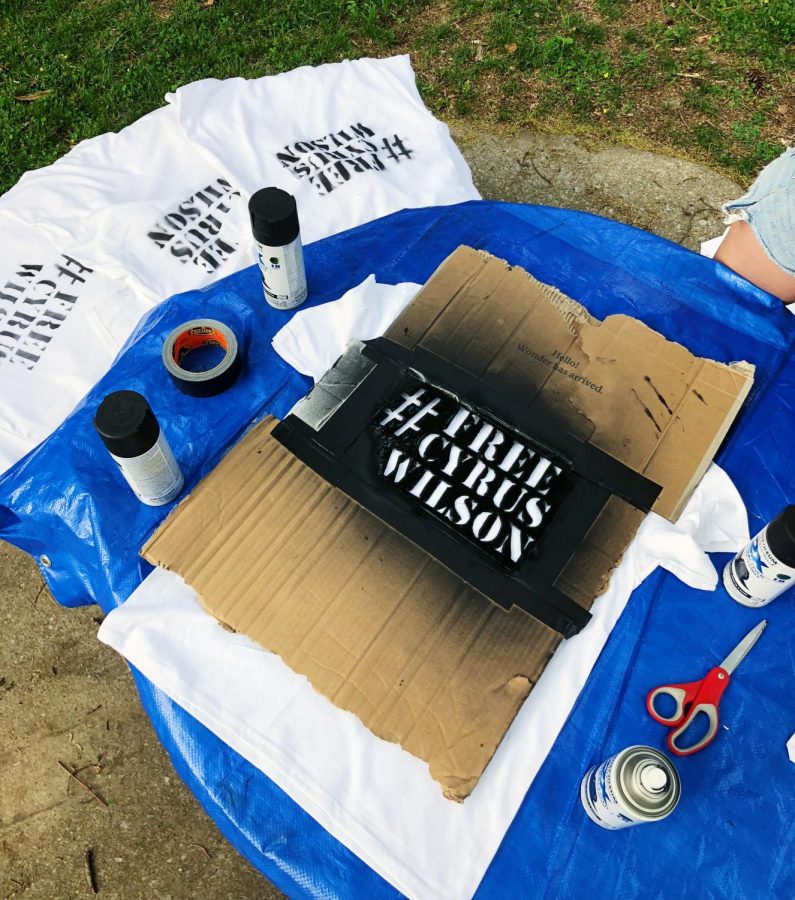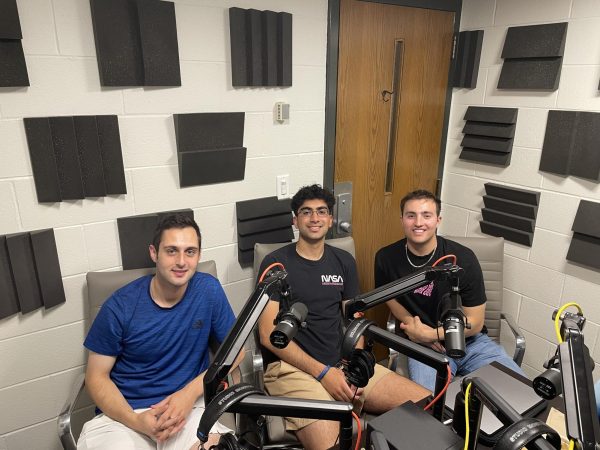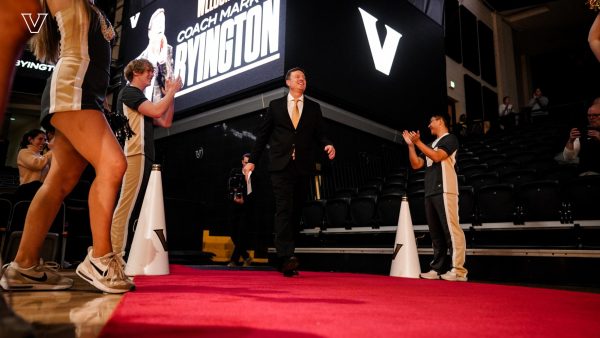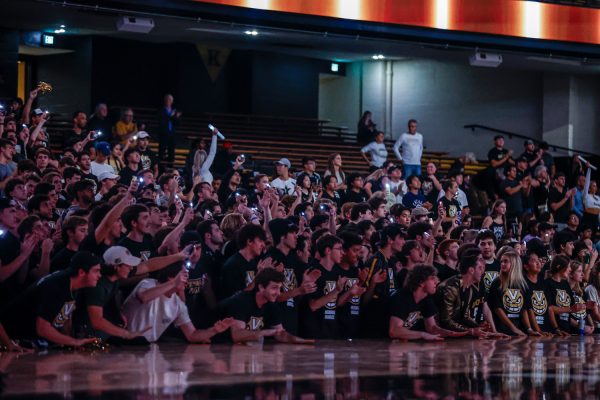Cyrus Wilson is fighting for justice, but he is not alone
As Cyrus Wilson heads to his parole hearing on the morning of April 17, he will be joined by over 200 students supporting his release
The most important thing when rallying around someone, advocates say, is keeping their voice at the center of activism. That can be difficult when that person is in prison.
“When people go to prison, it’s very easy for society to forget that they’re there,” Casey Wilson, Mr. Wilson’s wife, said in an interview with The Hustler. “Out of sight, out of mind.”
Mr. Wilson, a Nashvillian born and raised in the Edgehill neighborhood, was found guilty of first degree murder in 1994, when he was 19 years old. He was sentenced to life in prison despite his claims from the beginning that he is innocent, and is currently incarcerated in the Riverbend Maximum Security Facility in Nashville. The original case relied largely on witness testimony, as DNA evidence was rarely collected and the officers did not attempt to take fingerprints from the scene. Those witnesses, who were all juveniles at the time of the trial, recanted years later, saying they had been coerced or threatened into fabricating their testimonies by the police and the prosecution. While the courts rejected his appeals for a new trial based on the witnesses who came forward, his team is persisting in trying to prove his innocence.
For now, though, Mr. Wilson has a chance to come home after 27 years. He is eligible for parole and will go in front of the parole board on April 17.
Speaking his name
Throughout the 26 years they’ve known one another and through Mr. Wilson’s entire battle for justice, Mrs. Wilson said that he has managed to keep a positive outlook on his life and place in the world. Still, the events over the course of their marriage is not what she expected when she met Cyrus over the phone just months after his arrest, when the two were still teenagers.
“When we met, he was very honest, very upfront about why he was in jail. We believed that he would come home,” Mrs. Wilson said. “I had watched enough TV shows to know that the good guy never goes to prison. We were naive enough to believe that that was really how it was. Now, as we’re very aware, innocent people do go to prison more often than we probably see or hear.”
They married in 2014, after years of letter writing, phone calls and visitations. She has dedicated her life to fighting for both her husband and for others as a public defender in the city. She was timid early on, worried about the backlash and judgements she and her husband would face due to the stigma surrounding incarceration, she said. But with the help of Rahim Buford, a friend of Mr. Wilson’s who was also incarcerated at Riverbend and was released in 2015, and Rev. Jeannie Alexander, director of No Exceptions Prison Collective, Mrs. Wilson was able to find her voice and began speaking at legislative sessions, to reporters and to any community organizations that would listen.
“People started speaking his name over and over and over again. People took notice,” she said. “People took notice and they were like, I want to learn, I want to know why all these people keep saying this man’s name and I want to learn why he’s so special.”
Buford met Mr. Wilson in 2012 and the two quickly struck up a friendship because of their views about the world and the many similar experiences they had growing up as young men in Nashville. Buford promised Mr. Wilson that if he got out first, he would dedicate his freedom to bringing him justice. Since he returned home, after being in prison for 26 years, he has done just that. Buford, who is the director of the Community Bail Fund and Unheard Voices Nashville, started the Cyrus Wilson Freedom Campaign both to advocate for his friend’s release and exoneration and to raise awareness about the injustices present in the U.S. court system.
“As I got to know his situation and read up on his case and realize the injustice that he suffered, I made a pact,” Buford said. “I said ‘if I get out before you, I’m going to do everything within my power to help you clear your name and get your freedom.’ This is just me honoring the promise I made to a friend.”
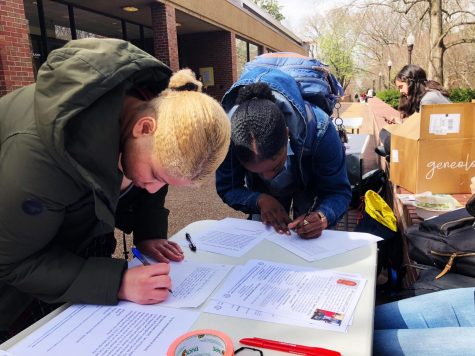
The campaign for Cyrus Wilson arrived at Vanderbilt through Rev. Alexander. At a January event hosted by The Vanderbilt Prison Project, Alexander mentioned supporting Mr. Wilson’s effort as one way students could take action towards justice. Inspired, student Minnie Mangafas continued to meet with Alexander and joined her and Buford in the campaign, along with Jenny Pigge, president of The Vanderbilt Prison Project.
The early efforts of the campaign on Vanderbilt’s campus largely centered around coalition building and letter writing. The Black Students Association and the Vanderbilt chapter of the NAACP joined the effort early in the process.
“We wanted to do something that would take us off campus and have a material impact on the Nashville community,” said Olivia Cherry, outgoing president of the Vanderbilt NAACP.
Other organizations have since joined the cause, including Vandy Fems and the Association of Latin American Students, who sent out a community letter of support earlier this week. Vanderbilt Student Government also took a stance on the matter, unanimously passing a resolution on April 3 in support of Mr. Wilson’s release. VSG sent a copy of the resolution to Governor Bill Lee, in which VSG asked that he consider granting Mr. Wilson clemency.
Through the student groups and various tabling efforts and visibility campaigns, over 230 letters of support for Mr. Wilson have been sent to the parole board, which have been added to his file according to representatives of the board. Students spent the week hanging posters and banners around campus, spray painting and wearing #FreeCyrusWilson shirts and spreading the effort on social media. The level of support the campaign has received, Pigge said, is unlike anything she’s seen at Vanderbilt.
It is not lost on the students that Mr. Wilson has been incarcerated longer than they have been alive, Mangafas said. Their energy and dedication to the cause, Mrs. Wilson said, has been shocking and overwhelming for her family.
“I’m just very excited about all the young people that have taken on many causes, but especially taken on Cyrus’ cause and speaking out for him and supporting him,” Mrs. Wilson said. “I know he is super appreciative and it has inspired my daughters. They were both pretty vocal to begin with, but to see a college campus and to see just the movement on the campus has been inspiring for them and it’s great to see. It encourages me, it makes me feel very positive about our future, the future of our country and the future of the world.”
Throughout the process, the student organizers have been in constant contact with Buford, Alexander, Mrs. Wilson and occasionally Mr. Wilson. All promotional materials and efforts have been approved by Mr. Wilson and his wife, and the group has made sure that Mr. Wilson’s priorities are their priorities.
“Sometimes people will say ‘be the voice for the voiceless,’ but there are no people who are voiceless,” Pigge said. “There are people whose voices have been, in this case, purposefully locked away or suppressed, and we can be magnifying those voices, but we’re not speaking for them. How could we claim to work for Cyrus’s freedom if we haven’t made sure that we know him or are making an effort to be connected to him and his family?”
Despite the support the campaign has received on campus, people in the system still face an uphill battle, Buford said. While Cyrus and his purported innocence have made him a good figure to rally around, even that has taken 27 years of tireless effort to come to fruition. Even in movements for justice, Buford said, the perspectives of those who have been incarcerated can be
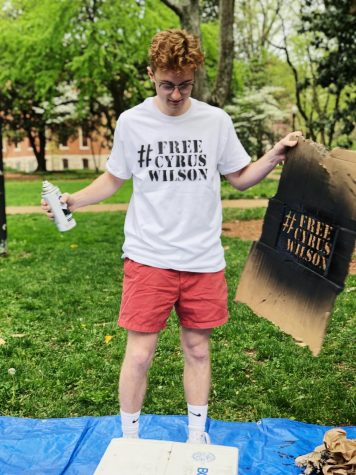
“People [are] more inclined to talk to people who have not been directly impacted by the system than they will be to talk to me,” Buford said. “There are no more experts in this matter of mass incarceration and mass criminalization than those who have gone through it, but they don’t want to hear what I have to say because they don’t want to validate the experience that I had, like somehow what formerly incarcerated people have to say is less valuable than people who theorize around mass incarceration.”
Mrs. Wilson recognizes that her husband’s situation is not unique. In the U.S., over 2 million people are incarcerated according to The Prison Policy Initiative. A conservative estimate by The Innocence Project, 1 percent of those, or 20,000 people, are falsely convicted, a group Mr. Wilson and his supporters say he belongs to.
“One thing Cyrus emphasizes is that he’s not so special – but he was willing to fight. He was willing to say ‘you’ve already stolen most of my life. You’re not going to steal my dignity. You’re not going to steal my integrity. You’re not going to steal what makes me a person,’” Mrs. Wilson said of her husband. “He used his voice to energize us, and to make us feel like we should speak out.”
A chance to come home
Mr. Wilson’s path to justice is currently taking two routes. On one, his lawyers are appealing his original conviction, seeking to prove his innocence and have the crime wiped from his record. The other effort is getting him home with his family on parole. On April 17 at 8 a.m., Mr. Wilson will face a parole board who will determine if he should be released to return to civilian life.
This process is troubling for someone who has maintained their innocence for the last 27 years.
“The parole board might use the fact that he’s maintaining his innocence against him, because they’ll say ‘oh, he’s not remorseful for what he did,’” Mangafas said. “So at this point, it actually makes more sense for him to say he’s guilty if all he’s trying to do is get out as fast as possible. The fact that he’s trying to maintain his innocence says a lot.”
Its purpose is to recommend whether or not he should serve out the remainder of his sentence on probation. As such, the board will not consider Mr. Wilson’s claim of innocence, or if his original trial was fair.
While many factors are included in the decision to grant parole, including testimony from key parties, social and criminal history, institutional record and proposed plan of release, a major component, organizers say, is the presence of the community at the hearing. With that in mind, the campaign has organized nearly 200 students and over 50 members of the Nashville community to show up in support of Wilson at his hearing early Wednesday morning. Under the state’s Sunshine Law, the parole hearing must be open to the general public.
“If we say that we stand for something – as an organization, as a student body, as an individual – you’ve got to show up where it counts,” Pigge said. “Physically putting your body in a space is a way to communicate to the parole board that not only do we believe Cyrus should be home with his family, with his wife and with his children, but also we’re showing up for Nashville because we believe our community wants and needs Cyrus. We believe Nashville will be better because he is free.“
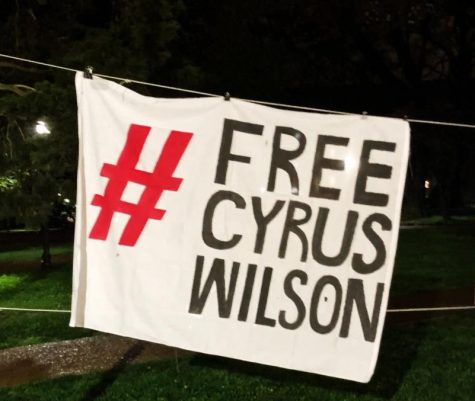
To Mangafas, showing up to the hearing is not just valuable to show community support, particularly when the hearing itself may be inaccessible to an individual’s network. She said that the 8 a.m. weekday timeslot of the hearing is woefully impractical for too many family members of incarcerated people, especially families who have to work and cannot control their schedules. As students, it is easier to miss class than for a family to forego a paycheck.
“What we know empirically is that when people turn out, they’re more likely to make a release,” Mangafas said.
With the large expected turnout for the hearing, there is a chance that not everyone will fit in the audience gallery. The team has been in communication with the parole board to ensure that the state understands just how large the crowd is expected to be, and the group has plans for a demonstration off of prison property for overflow supporters. The movement’s organizers emphasize that it is still necessary for every person to show up and sign into the attendance log so the parole board can see the level of community support for Mr. Wilson.
“We think the chance that he’s denied parole is very low,” Mangafas said. “It would be preposterous.”
Heading into the hearing, Mrs. Wilson says she is cautiously optimistic.
“We have gone into several situations and definitely have been let down,” she said. “I feel like all Cyrus has ever wanted, all our family has ever wanted, was for Cyrus to have a fair trial. And for tomorrow, we want him to have a fair parole hearing. We want them to not judge our innocence, that’s not the purpose of tomorrow. We want them to judge his character and who he is as a person and how successful he can be within our community, what his success looks like.”
Today, the day before the hearing, she said she is surprisingly calm, though she expects to be a bundle of nerves tomorrow. While she hadn’t yet spoken to him early Tuesday afternoon, she knew he was, much like her, preparing for Wednesday, and hoped they could find time to call.
“I definitely need to hear his voice and hear his reassurance,” she said. “And I’m sure he probably needs to hear mine too”
Eva Durchholz contributed to this report.

Sam Zern ('20) has been a member of The Vanderbilt Hustler since her freshman year, first as a staff writer and shortly after as assistant campus editor. She went on to be campus editor and, later, editor in chief. In her senior year at Vanderbilt, Sam was managing editor and streamlined recruitment and training processes.
In her time as a member of the editorial board, she has prioritized diversity and breadth in coverage, wanting to make sure as much of Vanderbilt as possible is represented in...

